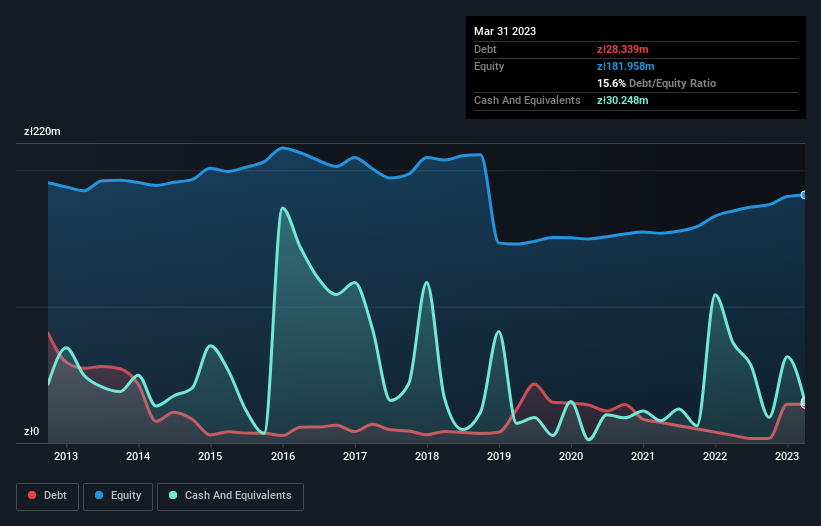
The external fund manager backed by Berkshire Hathaway's Charlie Munger, Li Lu, makes no bones about it when he says 'The biggest investment risk is not the volatility of prices, but whether you will suffer a permanent loss of capital.' It's only natural to consider a company's balance sheet when you examine how risky it is, since debt is often involved when a business collapses. As with many other companies ZUE S.A. (WSE:ZUE) makes use of debt. But is this debt a concern to shareholders?
When Is Debt Dangerous?
Debt is a tool to help businesses grow, but if a business is incapable of paying off its lenders, then it exists at their mercy. Part and parcel of capitalism is the process of 'creative destruction' where failed businesses are mercilessly liquidated by their bankers. However, a more frequent (but still costly) occurrence is where a company must issue shares at bargain-basement prices, permanently diluting shareholders, just to shore up its balance sheet. Of course, debt can be an important tool in businesses, particularly capital heavy businesses. When we examine debt levels, we first consider both cash and debt levels, together.
Check out our latest analysis for ZUE
What Is ZUE's Net Debt?
You can click the graphic below for the historical numbers, but it shows that as of March 2023 ZUE had zł28.3m of debt, an increase on zł5.60m, over one year. However, it does have zł30.2m in cash offsetting this, leading to net cash of zł1.91m.

How Strong Is ZUE's Balance Sheet?
Zooming in on the latest balance sheet data, we can see that ZUE had liabilities of zł383.2m due within 12 months and liabilities of zł55.2m due beyond that. On the other hand, it had cash of zł30.2m and zł283.7m worth of receivables due within a year. So its liabilities total zł124.5m more than the combination of its cash and short-term receivables.
This deficit is considerable relative to its market capitalization of zł126.6m, so it does suggest shareholders should keep an eye on ZUE's use of debt. This suggests shareholders would be heavily diluted if the company needed to shore up its balance sheet in a hurry. While it does have liabilities worth noting, ZUE also has more cash than debt, so we're pretty confident it can manage its debt safely.
But the other side of the story is that ZUE saw its EBIT decline by 7.7% over the last year. If earnings continue to decline at that rate the company may have increasing difficulty managing its debt load. When analysing debt levels, the balance sheet is the obvious place to start. But you can't view debt in total isolation; since ZUE will need earnings to service that debt. So when considering debt, it's definitely worth looking at the earnings trend. Click here for an interactive snapshot.
Finally, while the tax-man may adore accounting profits, lenders only accept cold hard cash. While ZUE has net cash on its balance sheet, it's still worth taking a look at its ability to convert earnings before interest and tax (EBIT) to free cash flow, to help us understand how quickly it is building (or eroding) that cash balance. Over the last three years, ZUE actually produced more free cash flow than EBIT. There's nothing better than incoming cash when it comes to staying in your lenders' good graces.
Summing Up
Although ZUE's balance sheet isn't particularly strong, due to the total liabilities, it is clearly positive to see that it has net cash of zł1.91m. And it impressed us with free cash flow of -zł48m, being 133% of its EBIT. So we don't have any problem with ZUE's use of debt. There's no doubt that we learn most about debt from the balance sheet. But ultimately, every company can contain risks that exist outside of the balance sheet. For example, we've discovered 2 warning signs for ZUE (1 shouldn't be ignored!) that you should be aware of before investing here.
If, after all that, you're more interested in a fast growing company with a rock-solid balance sheet, then check out our list of net cash growth stocks without delay.
Valuation is complex, but we're here to simplify it.
Discover if ZUE might be undervalued or overvalued with our detailed analysis, featuring fair value estimates, potential risks, dividends, insider trades, and its financial condition.
Access Free AnalysisHave feedback on this article? Concerned about the content? Get in touch with us directly. Alternatively, email editorial-team (at) simplywallst.com.
This article by Simply Wall St is general in nature. We provide commentary based on historical data and analyst forecasts only using an unbiased methodology and our articles are not intended to be financial advice. It does not constitute a recommendation to buy or sell any stock, and does not take account of your objectives, or your financial situation. We aim to bring you long-term focused analysis driven by fundamental data. Note that our analysis may not factor in the latest price-sensitive company announcements or qualitative material. Simply Wall St has no position in any stocks mentioned.
About WSE:ZUE
Excellent balance sheet and fair value.
Market Insights
Community Narratives



